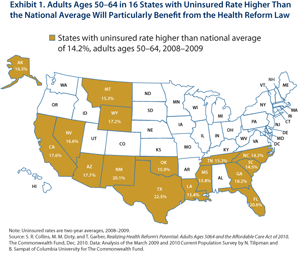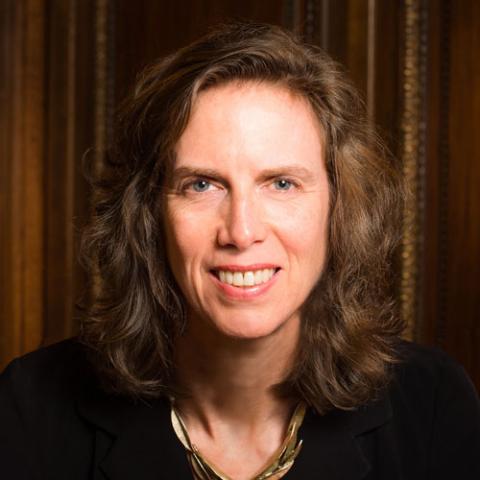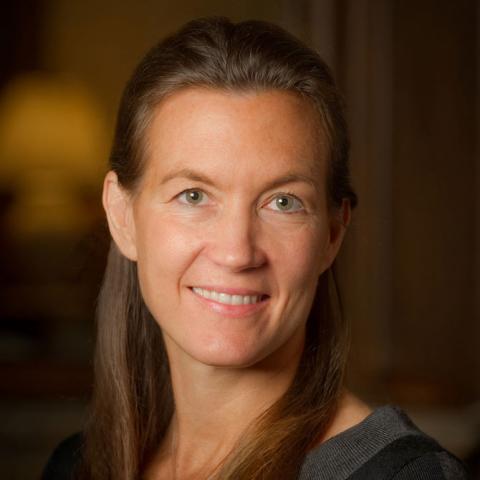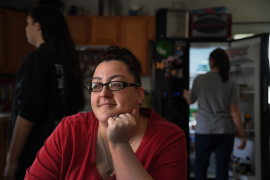The number of men and women ages 50 to 64 who are uninsured climbed to 8.6 million in 2009, an increase of 1.1 million from 2008.1 In addition, an estimated 9.7 million adults in this age group—sometimes known as "baby boomers"—have health insurance with such high out-of-pocket costs relative to income that they are effectively underinsured.2 Losses in coverage in the 50-to-64-year-old age group have been driven by record high unemployment. Approximately 2.2 million workers age 55 and older were unemployed in November 2010. Unemployed workers ages 55 to 64 had been jobless for an average of almost 45 weeks, the highest average unemployment duration of any age group under age 65 in this time period.3 As a result, the number of uninsured people in this age group likely climbed in 2010 as options for affordable health insurance dwindled and family budgets became more constrained.
Beginning in 2014, the American public will enter a new era in health care: loss of a job or a spouse or another life-changing event will no longer mean a loss of health insurance. Regardless of life circumstances, everyone will have access to comprehensive health insurance coverage. This will be achieved by a substantial expansion in eligibility for Medicaid benefits, subsidized private health insurance with comprehensive benefits through new state insurance exchanges, and new consumer protections in insurance markets including bans and restrictions on insurers denying coverage or charging exorbitant premiums based on health or age. At least 32 million uninsured people are projected to gain coverage by 2019. Of these, approximately 17 percent will be ages 50 to 64.
Prior to 2014, many adults in the 50-to-64 age group will benefit from early provisions in the law, many of which went into effect in 2010. These include preexisting condition insurance plans, which are now enrolling people in all 50 states and the District of Columbia; new coverage of preventive care and flu vaccines without cost-sharing; and a new long-term care insurance program. At least 3,600 employers across the country are now enrolled in the Affordable Care Act's early retiree reinsurance program that is helping companies lower premiums for early retirees. 
Beginning in 2014, of the 8.6 million baby boomers who were uninsured in 2009, up to 6.8 million may gain subsidized insurance through Medicaid or the insurance exchanges—3.3 million in families earning less than 133 percent of the federal poverty level would gain coverage under Medicaid, and 3.5 million earning less than 400 percent of poverty would gain subsidized private coverage through the insurance exchanges. Another 1.4 million with higher incomes would have access to health insurance plans with comprehensive benefits through the exchanges where they cannot be excluded from coverage or be charged exorbitant premiums based on health or age. Finally, the estimated 9.7 million older adults who are underinsured will gain more comprehensive benefit packages and greater protection from out-of-pocket costs and medical bills.
Sixteen states, mostly in the south and west, with uninsured rates higher than the national average of 14.2 percent for adults 50 to 64 will see particularly large gains (Exhibit 1).4 The states are: Florida, New Mexico, and Texas, where 20.1 percent to 22.5 percent of this age group were uninsured in 2008 and 2009; Alaska, Arizona, California, Georgia, Nevada, and Wyoming, where 16.5 percent to 18.2 percent were uninsured; Louisiana, Mississippi, Montana, Oklahoma, and Tennessee, where 15.3 percent to 15.9 percent were uninsured; and North Carolina and South Carolina, where 14.3 percent and 14.5 percent were uninsured.
The Affordable Care Act will help ensure that baby boomers who lose employer health benefits—whether as a result of a layoff or early retirement—have ready access to affordable and comprehensive insurance that will help them maintain their health while protecting their retirement savings.
1 Analysis of the March 2009 and 2010 Current Population Survey by N. Tilipman and B. Sampat of Columbia University for The Commonwealth Fund.
2 C. Schoen, S. R. Collins, J. L. Kriss, and M.M. Doty, "How Many Are Underinsured: Trends Among U.S. Adults, 2003 and 2007," Health Affairs Web Exclusive, June 10, 2008, w298–w309.
3 Bureau of Labor Statistics, News Release: The Employment Situation–November 2010 (Washington, D.C: U.S. Department of Labor, Dec. 3, 2010), http://www.bls.gov/news.release/pdf/empsit.pdf; M. Rich, "For the Unemployed Over 50, Fears of Never Working Again," New York Times, Sept. 19, 2010. The number of unemployed workers is seasonally adjusted; the duration of unemployment estimates are not seasonally adjusted.
4 Analysis of the March 2009 and 2010 Current Population Survey by N. Tilipman and B. Sampat of Columbia University for The Commonwealth Fund. Uninsured rates by states are shown as two-year averages to account for low sample sizes in some states. Over 2008 to 2009, 14.2 percent of 50-to-64 year olds were uninsured nationally. In 2009, 15 percent of older adults were uninsured.





